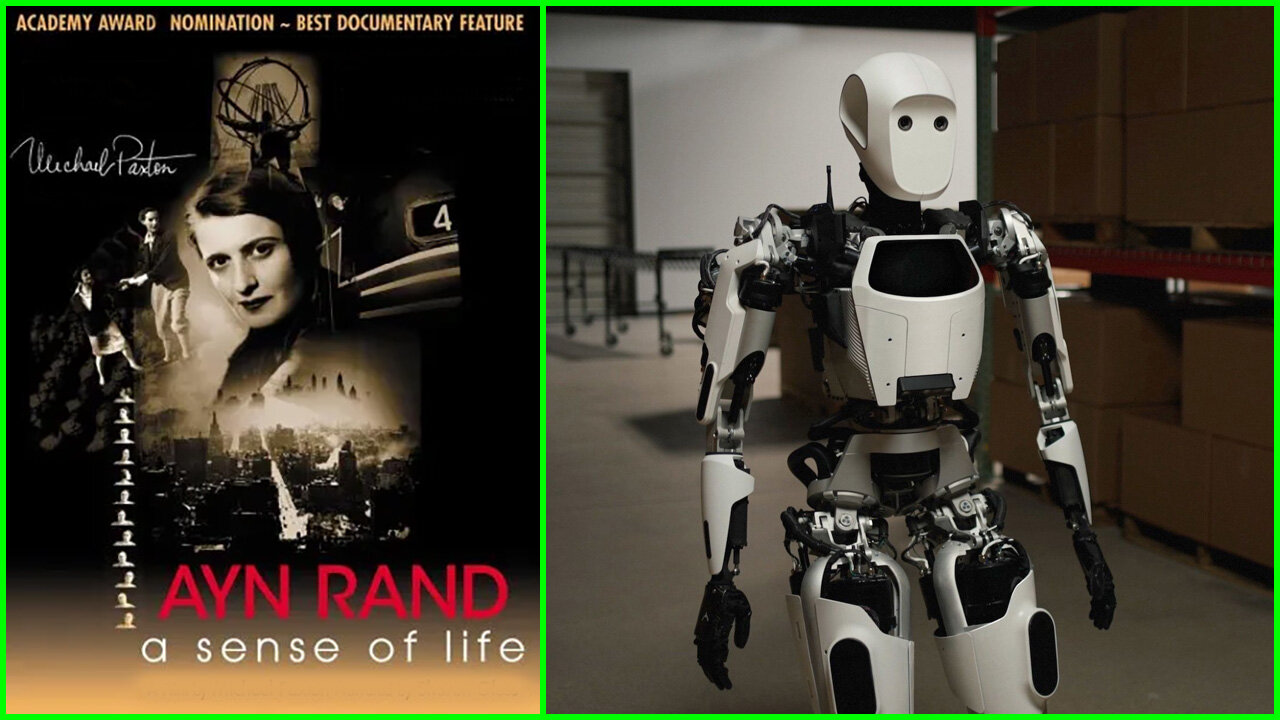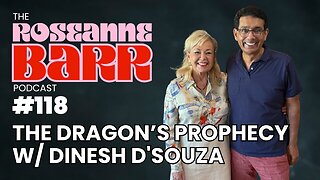Premium Only Content

'Ayn Rand: A Sense of Life' (1967) Documentary
The documentary, 'Ayn Rand: A Sense of Life', directed by Michael Paxton and nominated for an Academy Award, offers an intimate and intellectual portrait of one of the 20th century’s most controversial and influential thinkers. Subtitled “The Vision of Ayn Rand in Her Own Words,” the film serves both as a biographical chronicle and a thematic exploration of Rand’s ideas, tracing her journey from a young girl in Soviet Russia to the architect of Objectivism and the author of enduring philosophical novels like The Fountainhead and Atlas Shrugged.
At its core, 'A Sense of Life' is a tribute—not just to Rand’s life, but to her unique moral and intellectual vision. The film unfolds in roughly chronological order, using voiceover narration, photographs, rare footage, excerpts from her writings, and interviews with admirers, scholars, and those who knew her personally. These elements work together to convey the underlying "sense of life" that Rand championed: a worldview defined by reason, purpose, self-esteem, and the moral nobility of man as a heroic being.
The documentary begins in pre-revolutionary St. Petersburg, where Rand (born Alisa Rosenbaum) was raised in a bourgeois Jewish family. Her early disillusionment with collectivism, exacerbated by witnessing the Russian Revolution, becomes a recurring theme throughout the film. Her emigration to America in 1926 is depicted as a symbolic and literal embrace of individual freedom and possibility—themes that would permeate all her later work.
Once in Hollywood, Rand’s early struggles as a screenwriter and her first taste of success are recounted alongside the ideological development that would culminate in her major novels. The film highlights the publication and cultural impact of The Fountainhead (1943), portraying it as a clarion call for individualism in an age of conformity. The figure of Howard Roark, the uncompromising architect, becomes a cinematic metaphor for Rand’s own creative ethos.
The documentary’s narrative arc intensifies with the release of Atlas Shrugged (1957), a philosophical epic that marked both the peak of Rand’s fame and the beginning of her movement’s formalization. The film touches on her lectures, her circle of intellectual followers (notably the "Collective"), and the formation of Objectivism as a structured philosophy advocating reason, rational self-interest, capitalism, and the rejection of altruism.
But 'Ayn Rand: A Sense of Life' is not a hagiography. It acknowledges, albeit cautiously, Rand’s personal and ideological rigidity, her falling out with close associates like Nathaniel Branden, and the intensity of her convictions that often alienated even sympathetic audiences. Yet, the film frames these qualities not as flaws but as manifestations of Rand’s unwavering dedication to her principles—an embodiment of the very heroism she championed in her fiction.
A central concept explored is Rand’s belief in man’s potential for greatness. The documentary's title refers to what Rand called one’s “sense of life”—a subconscious, emotionally integrated appraisal of existence. Rand’s was one of reverence for the human mind and for life on Earth as a place where one could achieve happiness through reason and effort. The film seeks to embody this spirit through music, cinematography, and emotional narration, presenting Rand not just as a thinker, but as a cultural force animated by passion and certainty.
Conclusion
'Ayn Rand: A Sense of Life' is as much a philosophical love letter as it is a biographical documentary. While its tone is overtly admiring and perhaps insufficiently critical for some viewers, it succeeds in capturing the essence of Rand’s intellectual and emotional world. By portraying the development of her life alongside the evolution of her ideas, the film illuminates how deeply intertwined Rand’s biography was with her philosophy. For admirers of her work, it is an evocative and affirming experience; for others, it offers a clearer window into what made Ayn Rand not just a literary figure, but a cultural lightning rod whose ideas continue to provoke, inspire, and challenge.
-
 1:06:26
1:06:26
BonginoReport
4 hours agoPortland Protesters Plan Nude Bike Ride To Own Trump - Nightly Scroll w/ Hayley Caronia (Ep.148)
22K29 -
 LIVE
LIVE
The Jimmy Dore Show
3 hours agoButtigieg Keeps Pushing Burned Babies Hoax! Trump Changes Tune on Shutdowns! w/ Dr. John Campbell
7,631 watching -
 LIVE
LIVE
Nerdrotic
4 hours ago $4.01 earnedHollywood is TARIFFied, James Gunn Attacks Fans, Bill Burqa, RoP is Doomed | Friday Night Tights 374
1,645 watching -
 UPCOMING
UPCOMING
Sarah Westall
46 minutes agoGlobal Economic Picture Rapidly Changing as Chaos Continues to Drive Uncertainty w/ Nomi Prins
-
 LIVE
LIVE
The Mike Schwartz Show
1 hour agoTHE MIKE SCHWARTZ SHOW Evening Edtion 10-03-2025
3,719 watching -
 1:47:22
1:47:22
iCkEdMeL
2 hours ago $0.08 earnedFlag Burning, Antifa & Arrest: Journalist Nick Sortor Detained in Portland Chaos
1365 -
 LIVE
LIVE
SpartakusLIVE
1 hour ago#1 All-American HERO with LUSCIOUS hair and AVERAGE forehead brings Friday Night HYPE
440 watching -
 1:39:27
1:39:27
Roseanne Barr
4 hours agoThe Dragon’s Prophecy W/ Dinesh D’Souza | The Roseanne Barr Podcast #118
99.3K41 -
 28:24
28:24
Michael Franzese
3 hours agoHow Jewish Mafia Influenced American Organized Crime
25.9K24 -
 LIVE
LIVE
GritsGG
2 hours agoDuos! Most Wins in WORLD! 3680+!
44 watching
